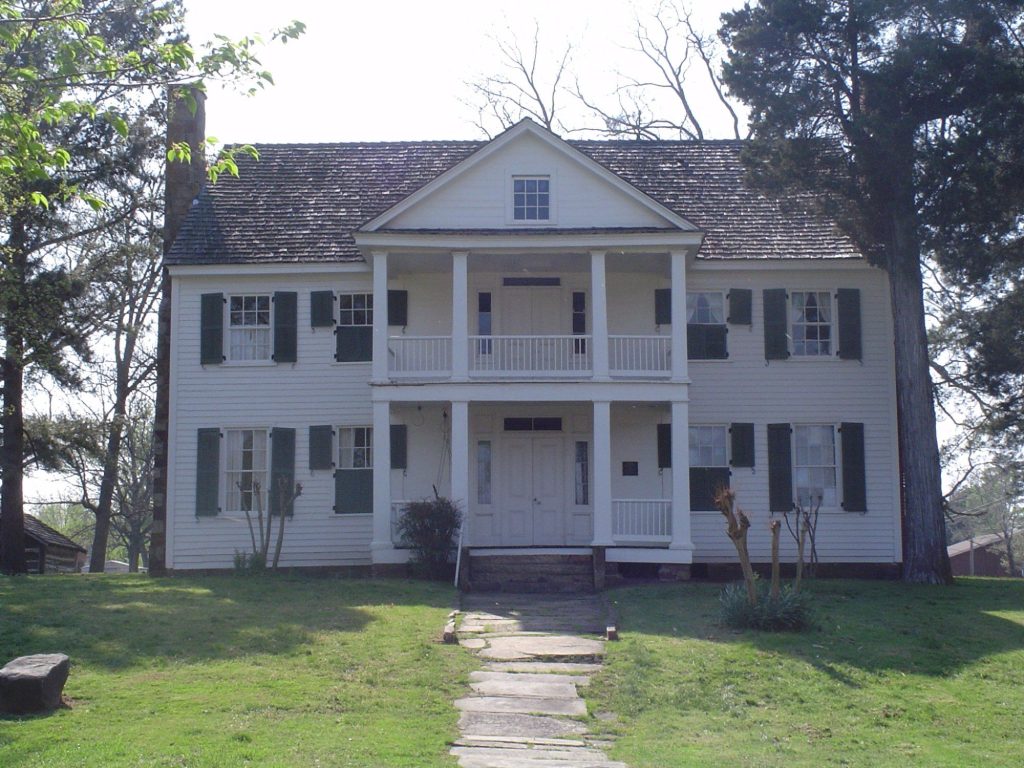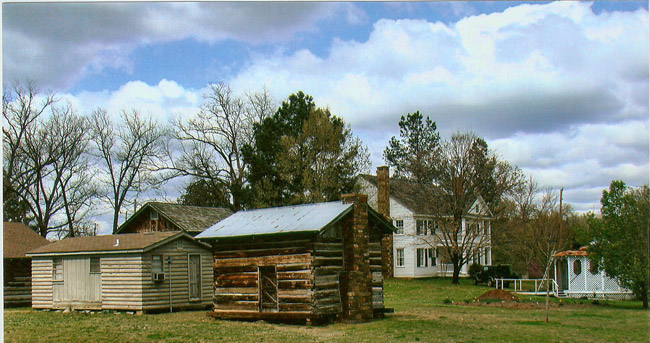By Dr. Curtis Varnell
A stately white mansion surrounded by numerous outbuildings sits just east of main street. Beautiful in design, it has two stories with a portico extending out from the entranceway. Chimneys extend fingers upward from each end of the building, casting shadows on the wooden shake roof. Surrounded by various log cabins, barns, and wagon sheds, Potts Tavern transports you back to antebellum days of Arkansas.

Potts Tavern was built by John Kirkbride Potts in the 1850’s. Potts was one of the founding fathers of Arkansas and very involved in the early history of the western part of the state. Born in Pennsylvania, he traveled west at age 17, eventually joining with William and Robert Logan as they migrated into Arkansas and settled in the river bottoms south of Magazine Mountain. It is said that the wagon train bringing the famous Logan family, Potts, and others to Arkansas stretched for 1 ¼ mile and consisted of numerous family members, livestock, and a number of slaves.
In 1828 a federal treaty removed the Cherokee from Arkansas allowing Potts and other to obtain land along the Arkansas River. Potts settled for a time at Galla Creek and served as an Indian agent for the Cherokee and Choctaw. He later bought a land patent for 650 acres of land on Galla Creek, paying the government twenty-five cents an acre for his land. He built a two-level log house on his property, a home his family lived in for the next twenty-five years.
Like many Arkansans, he joined the California gold-rush in 1849 and, like many others, failed to strike gold. A smart businessman, he realized that the real money was in supplying goods and food for the miners. He made at least two cattle drives, taking fattened cattle to the expanding California market. Using the considerable profit from his work, he returned to Arkansas and built the grand house that now stands on the property.

The beautiful home located along the major road west through central Arkansas attracted the eye of John Butterfield who was establishing a mail and passenger route to California. Contracting with Potts, the home became a favorite stage stop, hotel, and post office. One of the primary selling points for staying overnight at the tavern was the fact you could get a hot bath in an actual bathtub. The tub, located in the kitchen so that hot water was assessable, was probably not that private but was a luxury for travelers of that time period. Additionally, all guests used the same tub and water with the first guest paying a higher fee and the last having to empty the tub.
During the mid-1800’s, having a large outhouse was a sign of the family’s wealth and people were judged by the offering size of the facility. According to Mary Hall, a granddaughter of Potts, the tavern was furnished with an eight-seater making it one of the largest in the state.
Like many enterprises, the Civil War ended the days of the Butterfield Stage, shut down the post office, and brought the business to a standstill. Potts had at least 8 sons and 2 daughters and, upon his death in 1879, his decedents continued living in the home until it was sold to the Pope County Historical Foundation in 1970. It was placed on the National Historical Record in 1997 and serves as a museum today.
Visiting the home, seeing the surrounding historic buildings, and looking at the artifacts they contain can transport one through so much of our state and national history. Pioneer days with natives, Mexican war, California gold rush, first cattle trail drives, the Butterfield Stage, the Civil War; so much history that comes alive with just one visit. Potts Tavern is located in Pottsville, Arkansas just off I-40 east of Russellville.






